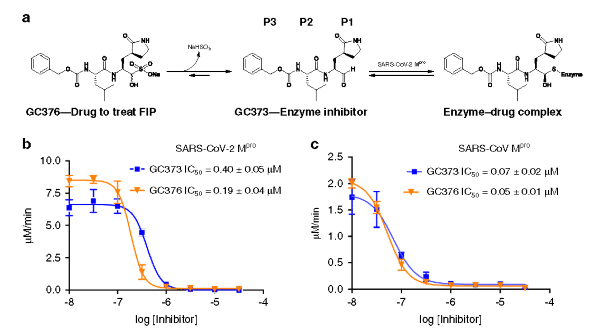Biochemist Joanne Lemieux at the University of Alberta (UofA) is leading a team to launch clinical trials of a drug used to cure coronavirus infection in cats.
Biochemist Joanne Lemieux and three other University of Alberta researchers in a joint work have shown that a drug that cures deadly peritonitis in cats also works well enough against the coronavirus that causes Covid-19. The study was published in the journal Nature Communications on Aug 27th.
The drug is a protease inhibitor. It targets a key proteinase (3CLpro) that plays an essential role in the viral life cycle. The enzyme mediates cleavage of two overlapping polyproteins at eleven specific sites generating 12 proteins and other intermediates required for viral replication. By inhibiting the enzyme, the drug stops viral replication—ending an infection.
The protease inhibitor was first studied by UofA chemist John Vederas and biochemist Michael James following the SARS outbreak in 2003. Veterinary scientists further developed the drug and showed it cures a fatal disease caused by the coronavirus in cats.

To test the drug against SARS-CoV-2 that causes Covid-19, four laboratories—the labs run by Lemieux, Vederas, biochemistry professor Howard Young and the founding director of the Li Ka Shing Institute of Virology, Lorne Tyrrell at UofA worked together.
Their findings are published in a peer-reviewed journal Nature Communications after submitting the manuscript on BioRxIV, a research website.
In the study, the researchers have shown that the drug effectively inhibited the enzyme from both SARS-CoV and SARS-CoV-2 with IC50 values in the nanomolar range (Figs). Also, the prodrug and its parent compound both are found to be potent inhibitors of SARS-CoV-2 replication in cell culture. The scientists strongly believe that the drug might be one of the ideal drug candidates for the treatment of human coronavirus infections because it has already been successful in animals.
To produce the human-grade drug, the researchers have established a partnership with the veterinary medicine company Anivive Life Sciences, which is making the drug for cats.
Professor Lemieux mentioned that the drug would be tested in Alberta in combination with remdesivir, which is already approved for conditional use in the treatment of Covid-19 in some countries including India, the USA, and Canada.















